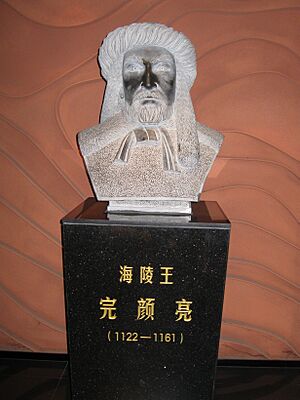Wanyan Liang facts for kids
Quick facts for kids Wanyan Liang完顔亮 |
|||||||||||||
|---|---|---|---|---|---|---|---|---|---|---|---|---|---|
 |
|||||||||||||
| Emperor of the Jin dynasty | |||||||||||||
| Reign | 9 January 1150 – 15 December 1161 | ||||||||||||
| Predecessor | Emperor Xizong | ||||||||||||
| Successor | Emperor Shizong | ||||||||||||
| Born | 24 February 1122 | ||||||||||||
| Died | 15 December 1161 (aged 39) | ||||||||||||
| Burial | Tomb of the Prince of Hailing (海陵王陵, in present-day Fangshan District, Beijing) | ||||||||||||
| Spouse | Empress Tudan others |
||||||||||||
| Issue | See § Family | ||||||||||||
|
|||||||||||||
| House | Wanyan | ||||||||||||
| Dynasty | Jin | ||||||||||||
| Father | Wanyan Zonggan | ||||||||||||
| Mother | Lady Da | ||||||||||||
| Wanyan Liang | |||||||
|---|---|---|---|---|---|---|---|
| Chinese | 金海陵王 | ||||||
|
|||||||
| Digunai | |||||||
| Chinese | 迪古乃 | ||||||
|
|||||||
| Wanyan Liang | |||||||
| Traditional Chinese | 完顏亮 | ||||||
| Simplified Chinese | 完颜亮 | ||||||
|
|||||||
Digunai (born February 24, 1122 – died December 15, 1161) was an important emperor of the Jin dynasty in China. He was also known by his Chinese name, Wanyan Liang, and later as the Prince of Hailing. He became the fourth emperor of the Jin dynasty, which was led by the Jurchen people.
Digunai was the second son of Wanyan Zonggan, who was the eldest son of the Jin dynasty's founder, Wanyan Aguda. Digunai took power in 1150 by overthrowing and killing the previous emperor, Emperor Xizong. During his time as emperor, he made big changes. He moved the Jin capital from Shangjing (in today's Harbin) to Yanjing (which is now Beijing). He also started a policy called sinicisation, which meant adopting more Chinese ways of life and culture.
In 1161, the Jin dynasty lost an important battle against the Southern Song dynasty. After this defeat, Digunai's own officers turned against him and killed him. Even though he ruled as an emperor, he was later given a lower title, "Prince Yang of Hailing." Later, he was even demoted to a commoner.
Contents
Early Life and Rise to Power
Digunai was the second son of Woben, also known as Wanyan Zonggan. His grandfather was Aguda, who founded the Jin dynasty. Digunai's mother, Lady Da, came from a respected family.
The Jin dynasty had a series of wars with the Song dynasty. During the rule of Emperor Xizong, Digunai's father, Wanyan Zonggan, was a very powerful person in the Jin court.
Digunai himself was an army marshal under Emperor Xizong. In 1150, he led a sudden takeover and removed Emperor Xizong from power. Because he took the throne by force, Digunai was very suspicious of other powerful Jurchen nobles. To secure his position, he removed many potential rivals from power.
His Time as Emperor
Digunai wanted the Jin dynasty to be the only major empire in China. He wanted to be seen as a true Chinese ruler. To do this, he made many changes:
- In 1150, he allowed people to wear Han Chinese clothes again.
- He adopted many Chinese customs, like holding special ceremonies in his capital.
- He started using the imperial carriage in 1151.
- He introduced a system of feudal rights in 1156.
- He also adopted the Song dynasty's court ceremonies in 1157.
Digunai also brought in the imperial examination system in 1150. This system allowed people to get government jobs based on their knowledge, not just their family background. He also set up the Imperial Academy the next year.
To further show his power and connect with Chinese traditions, Digunai moved his imperial court. In 1153, he moved it from Shangjing to Yanjing (present-day Beijing). In 1157, he even ordered the old imperial palaces in Shangjing to be destroyed.
Unlike some earlier Chinese dynasties, Digunai continued the Jurchen tradition of using harsh physical punishments. He was known for strictly punishing people who broke rules, even high-ranking officials.
Downfall and Assassination
Digunai wanted to conquer the Southern Song dynasty and unite all of China under Jin rule. However, his plans failed. His navy was defeated by Song forces in important battles in 1161, including the Battle of Tangdao and the Battle of Caishi.
After these defeats, many of his officers left him, and people in some areas rebelled. His own trusted helpers secretly planned against him. On December 15, 1161, they killed him in a military camp near the Yangtze River.
After Digunai's death, his cousin, Wulu, who had already started a rebellion against him, became the new emperor.
Family
Parents
- Father: Woben, also known as Wanyan Zonggan
- Mother: Empress Cixian, from the Da clan of Bohai
Children
Digunai had several children. His most notable sons included:
- Wanyan Guangying, who was named Crown Prince.
- Wanyan Yuanshou, who was known as the Prince of Chong.
- Wanyan Shensi'abu, who was known as the Prince of Su.
- Wanyan Guangyang, who was known as the Prince of Teng.
He also had daughters, including the Princess of Rong.
See also
 | Jewel Prestage |
 | Ella Baker |
 | Fannie Lou Hamer |

